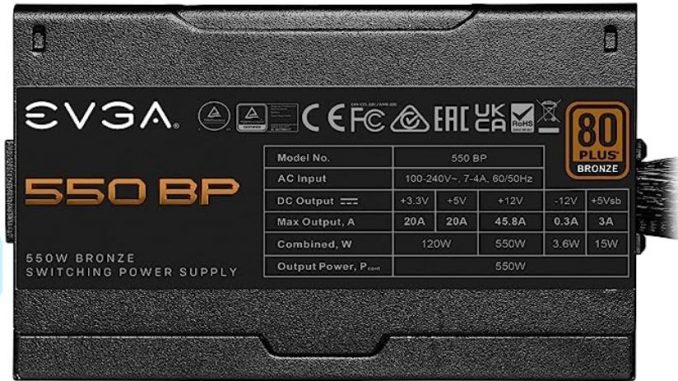
The power supply unit (PSU) of a desktop computer is akin to the heart of an animal. Absolutely vital yet it is often the most neglected component. Therefore, if you are buying or building a PC from its components, you should make sure that it has a PSU that has 80+ certification. If a PC comes with a low-quality PSU, it could fail and take many other components out with it. It is unlikely, but a PSU that fails can be the cause of a fire.
If you buy a new PC, look up reviews of the make and model of its power supply on the web that should be revealed on the unit itself. If there are bad reviews or no reviews, replace it with a suitable 80+ certified PSU.
To replace a PSU, take photos and/or make a drawing showing the connection of the components to it, remove the unit, screw the new unit in and attach the components to it. There are many videos on YouTube showing how to do that.
What is 80+ certification
When shopping for a computer or a power supply unit (PSU), you are sure to come across the 80+ certification specification regardless of the computer’s form factor.
Power supplies that are in the ATX form factor fit into ATX form-factor cases. 80+ certified power supplies are available for all of the form factors, such as the Small Form Factor (SFF) motherboards, cases and PSUs used in small computers.
Power Supply Form Factors Explained – Everything You Need to Know!-
https://www.overclockers.co.uk/blog/power-supply-form-factors-explained-everything-you-need-to-know/
80+ certification is a voluntary program that Ecos Consulting (now run by CLEAResult) brought in order to bring about the most efficient use of power by PSUs. The program tests and certifies PSUs that have more than 80% power efficiency at 20%, 50% and 100% of rated load and a power factor of 0.9 or greater at 100% load.
A PSU converts the AC mains power into the DC power that computers use. Power efficiency is the ratio of the output power (DC) to the input power (AC) of a PSU. For example, if a PSU draws 100W from the wall and delivers 80W to the components, it has an efficiency of 80%. The remaining 20W is wasted as heat and noise. The higher the efficiency the lower the power consumption and electricity bills, the less the generation of heat and the more silent the operation.
Power factor
Power factor is a measure of how well a PSU uses the AC current from the wall. A low power factor means that the PSU draws more current than it needs – is inefficient. A high power factor means that the PSU efficiently draws only the current that it needs.
The different levels of 80+ certification
There are six levels of 80+ certification, each with different requirements for efficiency and power factor at different loads.
Click on the link below to see a table showing those six levels:
https://en.wikipedia.org/wiki/80_Plus#Efficiency_level_certifications
Why does 80+ matter for ATX power supply units?
ATX is the standard form factor for desktop PSUs, which means they have a certain size, shape and connector layout. Most ATX PSUs have a rated power output between 300W and 1500W. If your computor uses more power than its PSU supplies, it will crash when in use. But if the computer has a much higher maximum output than it requires, it only draws what it needs. In other words, if the computer has a 900W PSU, but only requires a maximum of 450W, the 900W PSU will only deliver 450W. Such a system only needs a 500W unit. Your electricity bill will probably be a small amount higher, but you will have wasted money in buying such a powerful costly unit. Nevertheless, the higher the rated power output of a PSU, the more important it is for high efficiency and power factor.
Choosing an ATX PSU with an 80+ certification
There are many factors to consider when choosing an ATX PSU for a computer, such as wattage (500W), modularity (the ability to attach cables instead of having them all attached to the unit by default), noise level, warranty (can be as high as 10 years), form factor and price.
However, one of the most important factors is the level of efficiency and power factor. The level of efficiency and power factor that you need depends on your system requirements, usage patterns and personal preferences. Generally speaking, higher levels of efficiency and power factor offer more benefits but also cost more.
Following are some guidelines to help you choose an ATX PSU with an appropriate level of efficiency and power factor:
If you have a low-power system that consumes less than 300W under full load, or if you use your computer infrequently or only for basic tasks, you can opt for a basic 80+ PSU. This will provide you with adequate efficiency and power factor at a low cost.
If you have a mid-range system that consumes between 300W and 600W under full load, or if you use your computer regularly or for moderate tasks, you can opt for an 80+ Bronze or Silver PSU. This will provide you with good efficiency and power factor at a reasonable cost.
If you have a high-end system that consumes more than 600W under full load, or if you use your computer frequently or for intensive tasks, you can opt for an 80+ Gold, Platinum or Titanium PSU. This will provide you with excellent efficiency and power factor.
Power supply calculator
Most computers do not require anything more than a 500W or 600W poser supply. If your computing requires a high level of power, you can make use of the power supply calculator at the following link to determine which level of PSU to buy.
OuterVision® Power Supply Calculator –